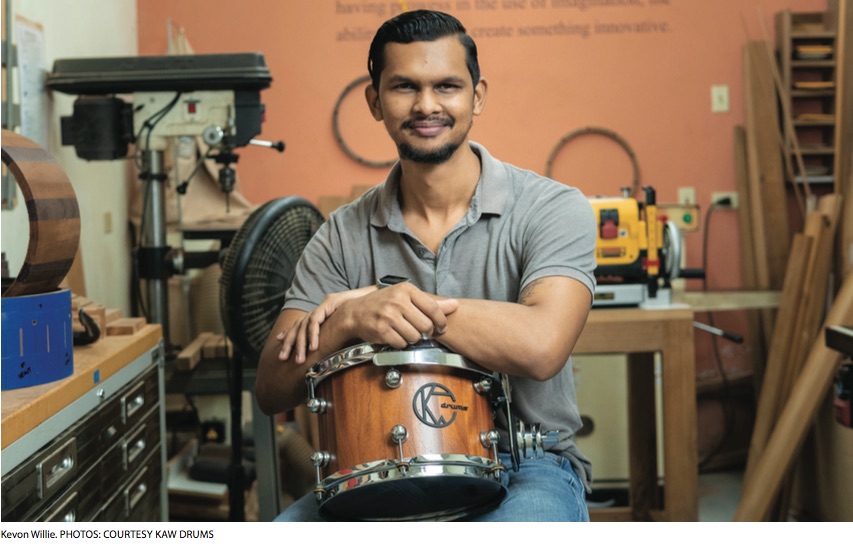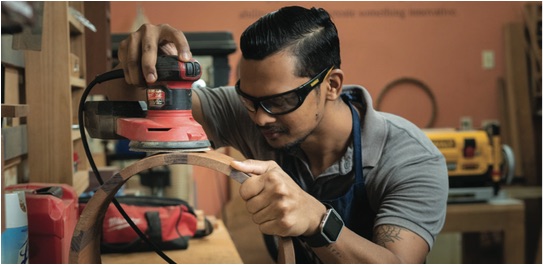By Serah Acham
When Kevon Willie started KAW Drums in 2013, he was looking for a sound for Trinidad and Tobago. In 2021, in the middle of an unrelenting pandemic that cancelled the festival for which this country lives and which lives in every Trinbagonian, he used his drums to honour that sound and to show us that it would live forever.

KAW Drums is a custom-made-drum company whose instruments look as beautiful as the music they make. Using high-quality local wood, with the first made for Panorama, and now supplying drums to many in the Carnival industry, the company’s identity is as rooted in Carnival and T&T as it is in its owner’s passion for the drum.
Born and bred in South Trinidad, with parents who were pastors, Kevon grew up in his church, where music flowed and a drum set was always close.
“I played drums for my kindergarten graduation,” he says, explaining just how early his life in music began.
At eight years old, he was drumming the beat to church services. As a student at St Benedict’s College, where “everything was about music”, he played with the band, performing at every school event and winning the National Gas Company of Trinidad and Tobago (NGC) Sanfest twice. He was also involved in “drum clinics” with the drumming community. Kevon thought his path was set – after secondary school, he’d go on to attend Berklee College of Music or Full Sail University because, “I always wanted to study drums, always wanted to be a part of drums”.
Instead, he did as his parents wished and, in 2010, enrolled in UWI’s Mechanical Engineering programme, choosing to pursue his love of music outside the classroom. Until, that is, he found a way to bring drums front and centre once more.
“I always wanted to explore...some studies with musical instruments,” he shares. So, for his final-year project, he took Professor (and now Campus Principal) Brian Copeland’s “pan course” (The Technology of the Steelpan) and “that’s where it started for me”. Making an instrument and the feeling of accomplishment that followed was “mind-blowing”.
“I recall Kevon as student on the course,” says Professor Copeland. “That course never had a sizeable enrolment but those who enrolled were generally very committed and engaged.”
The Campus Principal, himself an innovator with the steelpan, said that for many the course was seen as a risk because engineering students could not see it as part of their career path. Kevon, he says, “embodies what is, to me, the kind of graduate that the country needs right now.”
Copeland continues, “he has become an entrepreneur, one with foreign earning potential centred on a product based on competitive uniqueness and driven by technology and know-how. That is what we have been envisaging for our graduates in our Innovation and Entrepreneurship initiative at The UWI.”
Once Kevon had his degree in hand, with a major in Manufacturing and Production and Design, he says, “I applied it to drums”.
Having lived in the local music community, witnessing and joining jam sessions with great musicians, he saw “what people were looking for in terms of a sound for Trinidad”.
Kevon started with Panorama, where the steelbands are so large that the only drummer in the 120-performer ensemble would be drowned out. “Drummers wanted a louder snare” to project their sound over the entire band, he says. However, what they needed hadn’t yet been made. “That’s when we came up with our Panorama snare.”
The first was made for Bunji Garlin’s then-drummer, and the reviews from that performance – Kevon posted a short clip of it online – were phenomenal. The orders started coming in one by one, “and then word just spread because people would throw up videos on Instagram”. That’s when he realised he had a viable business idea and, in 2013, at 22 years old, Kevon launched KAW Drums – to this date, the only crafter of custom drum kits in the Caribbean.

That “Panorama snare”, made from thick brass, is KAW Drums’ only standard snare. Everything else is custom-made, usually with a mix of wood and metal.
“The woods definitely have a big part to play” in the sound each drum produces, he says. Mahogany, for example, produces “low, warm tones”; purple heart generates a sound “more high and pitchy”. And he only uses Caribbean woods, with most coming from local forests – mahogany, teak, appamatte and mora, for example – because “the wood we have in Trinidad is some of the best.”
Eight years after its launch, KAW Drums has joined the global music community, with drums in the hands of some of the top musicians in the US, UK, Paris and wider Caribbean. Think of the drummers who’ve played for Mary J Blige, Beyonce, Stevie Wonder, and Chronixx. UK-based, Trini-born Richard Bailey, “one of the biggest drummers of the past era, [who] played with Bob Marley and Steve Winwood” is on that list, Kevon says. And it’s a list that keeps getting longer, helped by one KAW Drums offspring that’s sitting in New York-based club, Groove.

“It’s one of the legendary clubs where Jimi Hendrix and all those artistes that came from New York passed through,” Kevon says. The house snare is one of his. “Many drummers… play it and give us reviews,” or ask how they can score one for themselves. While the world is still discovering the sound of KAW Drums, at home, it has become integral to Carnival. Most of our soca artistes use Kevon’s drums, including Kes, Bunji Garlin and Ravi B. For Carnival 2020, nine out of 12 bands featured KAW Drums snares, including Exodus.
This year, feeling the loss we all did without Carnival, KAW Drums hosted “Tiny Fete” – a small production posted on its YouTube and Instagram channels, meant to spread some Carnival vibes and pay tribute to the drummers whose beats have us jumping and wining, throwing our hands in the air and our waists this way and that. With Hans Dieffenthaller, Gerion Williams and Alpha Simpson on board, the KAW Drums team set up their shop with a drum kit, records and lights, and hosted small sessions with soca’s “foundation drummers”. The message to T&T from KAW Drums: “The beat is still here. The sound is still here. Soca will never die.”
As for why his drums resonate so strongly with drummers who play them, Kevon thinks “it’s the love and the energy put into making the drum that’s reflected in the sound… along with the engineering part”.